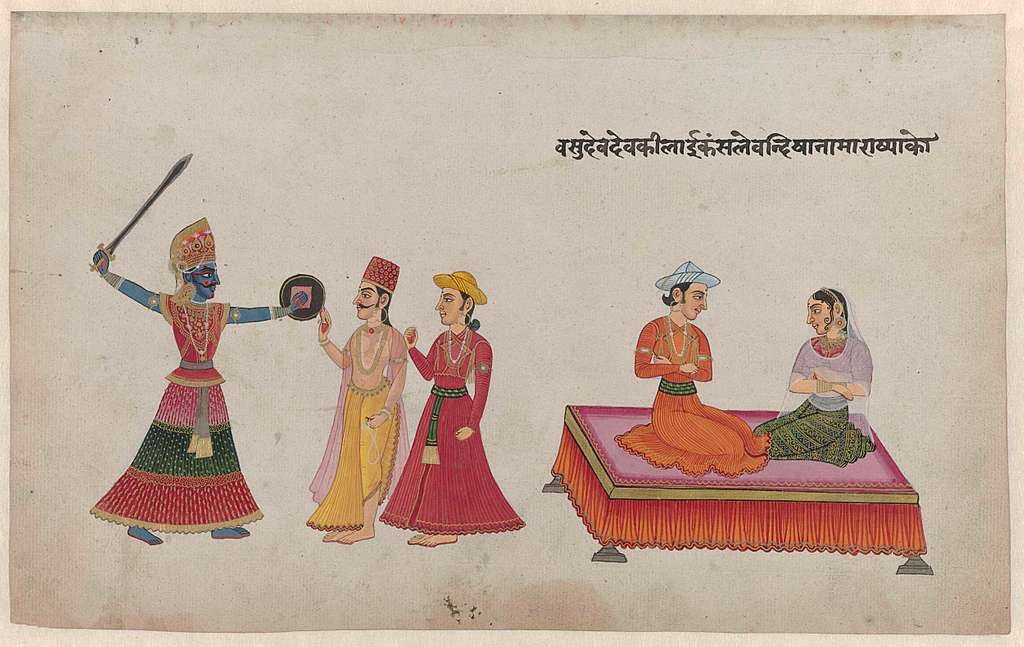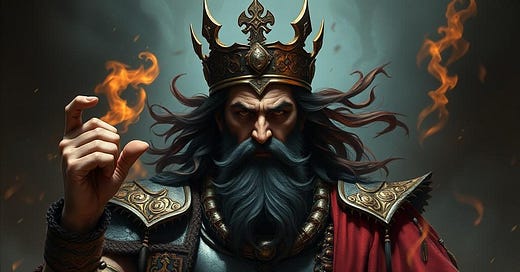Across every country and culture, in both ancient and modern times, tales of tyrants, heroes, and magical events have endured. Here, I retell one such story from ancient India.
A heartfelt thank you to everyone who has upgraded their subscription! Your support means the world!Once upon a time, a prince heard a prophecy on the day of his sister’s wedding: her eighth-born child would kill him.
Fear took root.
Kamsa, for that was his name, had once looked upon his sister Devaki with affection.
The Oracle’s words broke that bond - her eighth-born would be his doom.
Shocked, he tried to kill her at once.

She was saved only by the quick thinking of her groom, Prince Vasudev, who made an extreme promise in return for her life.
What was the promise? Their child.
Satisfied, Kamsa let her live—but threw them both into prison.
Each time Devaki gave birth, Vasudev, true to his word, reluctantly took the newborn from her arms and handed them over to Kamsa.
Despite Devaki’s cries that the infants were not the eighth-born, Kamsa took no chances. What if the Oracle had miscounted?
On his way out, he smashed each baby against the cold stone walls of the prison.
So it transpired six times.1
The seventh child was declared a miscarriage.2
Then came the news of the eighth baby.
As Devaki’s pregnancy progressed, Kamsa’s anxiety deepened.
The nine months ground too slowly for his comfort.
He impatiently queried his loyal advisors: Is it time? Is the baby born?
Other times, he cursed himself. Why did I spare my sister? If I had killed her before she gave birth, I wouldn’t be trapped in this nightmare.
But killing a woman was against a warrior’s code.
Yet had his brother-in-law not intervened, Kamsa knew he would have broken it—so terrified had he become of the prophecy.
At last, the day arrived.
Heavy rain and winds lashed the prison and palace walls.
On the stroke of midnight, the baby was born.
Instead of crying and awakening the guards, the baby gurgled and smiled at his parents.
Devaki wept at the innocence on his face.
Vasudev’s heart grew heavy with the weight of the impending doom.
But wait—no guards came rushing in!
The iron chains binding Vasudev fell away, freeing him.
Surprised, he stepped outside the cell.
The guards lay fast asleep as though drugged.
A chance?
Could he dare?
What if he smuggled the child to his friend across the river?
Devaki kissed her baby one last time, then quickly helped Vasudev wrap him in a blanket, hidden in a weaver’s basket.
With his heart pounding, Vasudev began his perilous journey, slipping past the sleeping guards and out of the palace.
At every step, fortune did favor his courage.
The guards lay stupefied, and the gates stood open.
The baby played with its hands soundlessly, enjoying its midnight tryst.
The prince reached the river’s edge and plunged in - the raging waters calmed just enough to allow him passage, barely rising past his waist.
In the village, not a soul stirred.
Sleep had also wrapped its blanket soundly around his friend’s household.
The mother, having just given birth, lay deep in slumber, as did the midwife in the room.
The newborn nestled comfortably in the cocoon of its mother’s chosen blanket.
The prince exchanged the two babies. A girl for a boy.
No one the wiser in his friend’s home.4
Hastening back, Vasudev slipped into his cell and shared the story with his wife.
As she cradled the newborn, the prince’s iron shackles snapped back into place.
The baby let out a loud wail, shattering the silence.
The guards jolted awake.
Eager for a reward, they rushed to Kamsa, announcing the birth of the eighth-born!
Kamsa, too, had fallen under the spell of that magic.
Now, he awoke with a start, grabbed his sword, and stormed toward the prison—his heart pounding at the thought of finally killing his enemy.
Reaching the prison cell, he snatched the baby from his sister’s arms.
Devaki pleaded for mercy, but Kamsa, mad with fear, ignored her cries.
Holding the infant at arm’s length, he studied his professed killer—then, with grim satisfaction, hurled her high against the prison cell wall.
But the baby never hit the wall.
Instead, she transformed mid-air into the Goddess of Power5.
Laughing at Kamsa, she said: "Foolish man, you cannot kill me so easily. The child you fear is safe—and one day, he will return to fulfill the prophecy."
Kamsa's rage knew no bounds. The eighth born lived. But how?
Unable to grasp what had transpired, he railed against the parents, his mind clouded by the failure.
Refusing to release them, he stormed back to his palace, fuming and afraid.
Yes, he was also the king now, having imprisoned his father the same day he had locked away his sister.
He summoned his loyalists, and his generals, and decreed: All newborns in the kingdom under a year old6 were to be slaughtered.
Without mercy.
His soldiers carried out his orders.
Some feared the king’s power.
Others enjoyed the rewards he handed out when pleased.
Each home was ransacked. Every infant found was slain.
Soon, there were no babies under a year old left in the kingdom.
Yet, Kamsa’s mind found no peace.
How could he be certain he had killed that child?
Soon, word reached him of a newborn across the river, born to a village chieftain.
Suspicion took root.
He sent demons to kill the infant.
One by one, they perished—each in a peculiar way.
The king became more enraged.
When he heard of the child's unnatural feats, Kamsa doubled his efforts.
Attempts that ended in failure.
Sleep became his enemy.
Shadows foretold death, so he sheathed and unsheathed his sword at every sound around him, startling his guards.
When he did sleep, he dreamt he was being killed and awoke in a sweat, his breath ragged, his hands clutching his throat in fear.
The days held no pleasure.
He took to pacing the rich floors of his palace.
Surrounded by every pleasure wealth could offer—yet his mind, oh, his mind.
Shattered. Haunted. Broken by the fear of what might come.
Meanwhile, the boy had a carefree childhood, delighting everyone around him with his many adventures.
But on his throne, Kamsa found no peace.
For eleven long years, he lived in the shadow of fear.
His hatred of this boy grew.
His mind was consumed by a single thought: What will happen to me? How can I stop my fate? How can I kill the child before he kills me?
He yelled, he roared, he punished innocents, killing many, without rhyme or reason.
Awake or asleep, the boy haunted him.
Food lost its appeal. Sleep had already fled.
Would today be the day the boy came for him? He wondered each morning.
In a fit of desperation, he decided to force an encounter with the boy - whose very name he despised.
Under the guise of a royal event, he sent an invitation to the boy through his ambassador - laced with sweetness, masking the deception.
Kamsa hoped to lure his nemesis to his doom.
The boy accepted the invite, despite the fears of his family—after all, he was born a warrior, even if his adoptive parents were cowherds.
With his older brother, the seventh-born, by his side, he set out toward the kingdom of his grandfather.
Charming the citizens along the way, he approached the competition—calm, unhurried, unafraid.
However, the tyrannized people worried: how could an eleven-year-old boy stand against a powerful king ?
The boy smiled, untroubled by their concerns.
At the palace gates, the king arranged for a rogue elephant to trample him.
But the elephant fell instead.
Then, the boy entered the arena boldly, standing there, with hands on his waist, allowing Kamsa to finally behold his tormentor in the flesh.
Demons unleashed against him were dispatched with ease.
As he watched the boy—a mere wisp of a child—vanquish his most powerful demons, the king trembled.
Gripped by fear—his nightmares made real—Kamsa could not escape the relentless march of his own deeds, each cruel step leading him inexorably towards this moment.
He had conquered and oppressed men, slain infants, imprisoned his own kin, drowned his kingdom in blood. To what end?
The boy ended his last fight, then leapt across the arena.
Striding up to the terrified king, he lifted him from his throne and hurled him to the ground.
There was no more fight left in the evil man.
In moments, the king lay dead on the arena floor.
People erupted in joy.
Though the king was the boy’s uncle, it did not spare him from the consequences of his actions.
The young boy freed his parents, and grandfather, restoring him to his rightful throne.
Then, he hugged his birth mother closely, offering a solace she had not known in years.
Thus, came to an end, the life of Kamsa, the tyrant who had used his power without mercy.
At last, he had met his nemesis in an eleven-year old boy who knew no fear.7
Was it a prophecy that doomed Kamsa, or had his own deeds sealed his end?
This backstory is the free read of the week:
Devaki had to undergo this ordeal because the eighth-born was to kill the evil king and free everyone from his rule. Sacrifices for a larger goal? There is also a backstory to why Kamsa killed the six babies.
In fact, the unborn baby was transferred - by divine intervention - to the womb of the prince’s first wife, who lived across the river, under the protection of his friends—a village chieftain and his wife. Surrogacy in ancient times?
According to Hindu philosophy, Maya is the illusory force of the universe. Read this post for more on Maya.
Attributed to the illusory force helping the exchange. Vasudev was divinely advised to exchange the babies.
Or another version of Maya, the illusory force.
An indeterminate period: somewhere from ten days to a year.
This is the story of Krishna, considered a complete incarnation of the Preserver-God.







“ Yes, he was also the king now, having imprisoned his father the same day he had locked away his sister.” I am reminded of Shakespeare’s McBeth. Wonderful magical story Jayshree ✨🤗💖
Was Sita innocent? Sita Sings the Blues
https://www.youtube.com/watch?v=RzTg7YXuy34